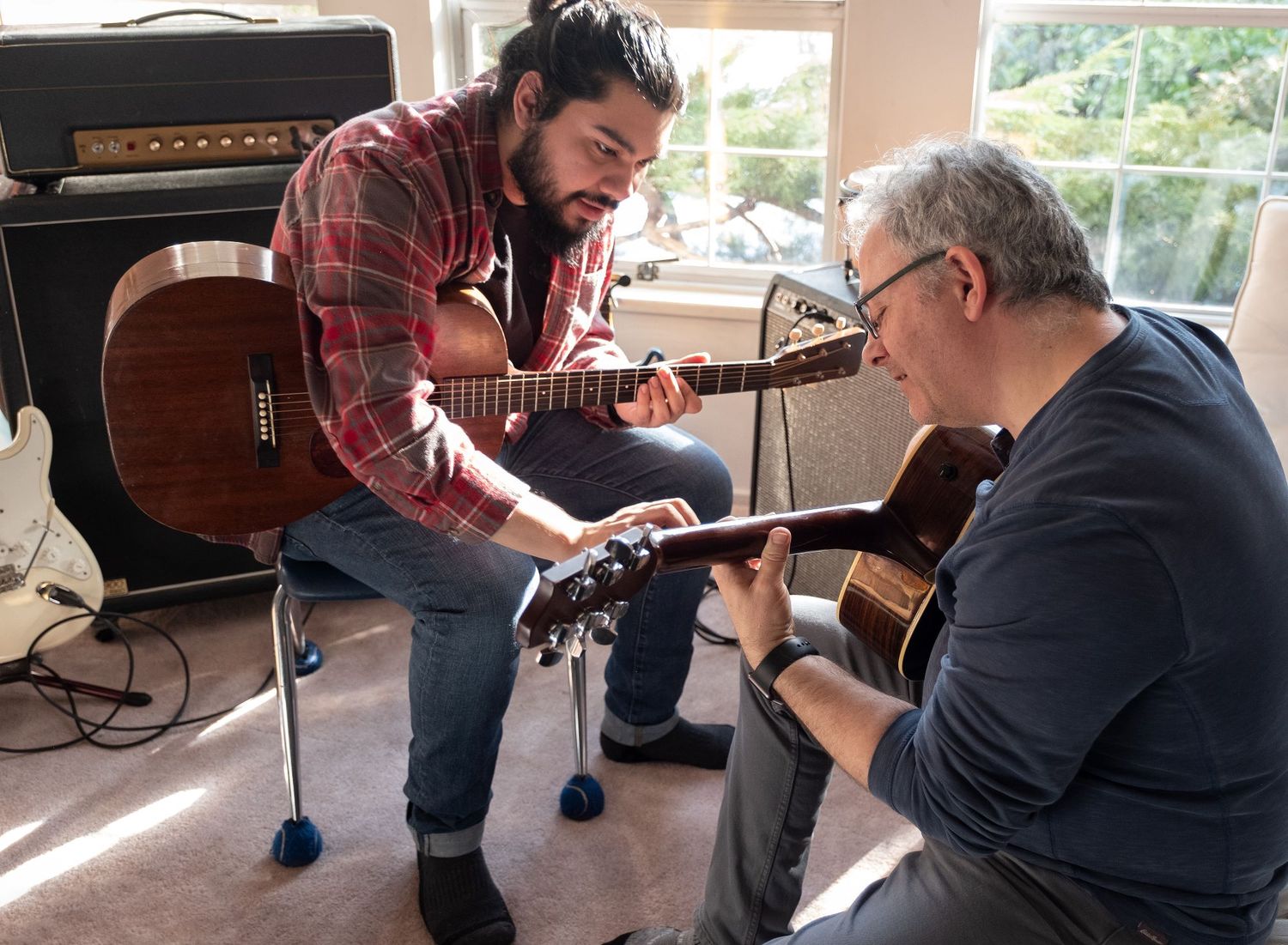Home>Events & Info>Music Therapy>How Music Therapy Can Help Schizophrenia


Music Therapy
How Music Therapy Can Help Schizophrenia
Published: February 2, 2024
Discover the benefits of music therapy for schizophrenia, and how it can aid in managing symptoms and promoting overall mental well-being. Learn more about the power of music therapy today.
(Many of the links in this article redirect to a specific reviewed product. Your purchase of these products through affiliate links helps to generate commission for AudioLover.com, at no extra cost. Learn more)
Table of Contents
- Introduction
- Understanding Schizophrenia
- What is Music Therapy?
- How Does Music Therapy Help Schizophrenia?
- Benefits of Music Therapy for Schizophrenia Patients
- Different Approaches to Music Therapy for Schizophrenia
- Case Studies and Success Stories
- Challenges and Limitations of Music Therapy for Schizophrenia
- Conclusion
- References
Introduction
Welcome to the world of music therapy, a powerful and transformative approach to mental health treatment. In this article, we will delve into how music therapy can help individuals with schizophrenia, a complex and challenging mental disorder.
Schizophrenia affects approximately 20 million people worldwide, making it one of the most prevalent mental illnesses. It is characterized by a range of symptoms including hallucinations, delusions, disorganized thinking, and social withdrawal.
Traditional treatments for schizophrenia often involve a combination of medication, therapy, and support services. However, music therapy offers a unique and complementary approach, tapping into the innate power of music to foster emotional expression, communication, and personal growth.
Music therapy, as defined by the American Music Therapy Association (AMTA), is the clinical and evidence-based use of music interventions to address individualized goals within a therapeutic relationship by a credentialed professional who has completed an approved music therapy program. It involves various techniques such as listening to and creating music, as well as verbal and non-verbal communication through musical expressions.
Now, let’s explore how music therapy can specifically benefit individuals with schizophrenia and how it can be a valuable addition to their overall treatment plan.
Understanding Schizophrenia
Schizophrenia is a chronic and severe mental disorder that affects a person’s perception of reality, thoughts, emotions, and behavior. It typically begins in early adulthood and can cause significant impairment in daily functioning and quality of life.
The exact cause of schizophrenia is still unknown, but research suggests that a combination of genetic, environmental, and brain chemistry factors contribute to its development. It is not caused by upbringing, character flaws, or personal weakness.
Symptoms of schizophrenia can vary from person to person and are classified into three broad categories: positive symptoms, negative symptoms, and cognitive symptoms.
Positive symptoms are characterized by a distortion of normal functioning and include hallucinations (perceiving things that aren’t there), delusions (having false beliefs), disorganized thinking and speech, and abnormal motor behavior.
Negative symptoms involve a loss or decrease in normal functioning and can include reduced expression of emotions, decreased ability to initiate and sustain activities, diminished speech and social engagement, and a lack of motivation or interest.
Cognitive symptoms affect a person’s thinking, memory, and ability to make decisions. They can include problems with attention, memory deficits, and difficulty with executive functioning, such as planning and prioritizing.
Living with schizophrenia can be incredibly challenging for individuals and their families. It can lead to significant social isolation, difficulties in maintaining relationships and employment, and an increased risk of substance abuse and suicide.
While medication is often prescribed to manage symptoms, it is not always sufficient. This is where music therapy comes in as a complementary treatment approach that can provide significant benefits for individuals with schizophrenia.
What is Music Therapy?
Music therapy is a specialized form of therapy that harnesses the power of music to address physical, emotional, cognitive, and social needs of individuals. It is an evidence-based practice that is conducted by trained and certified music therapists, who use music interventions to achieve therapeutic goals.
Music therapy can take various forms, including listening to music, playing instruments, singing, songwriting, improvisation, and movement to music. The therapist creates a safe and supportive environment where individuals can engage in musical activities that are tailored to their unique needs and goals.
One of the key principles of music therapy is the non-verbal nature of music. It allows for expression and communication when words may be difficult to find or express. Music has a universal language that can transcend cultural, linguistic, and cognitive barriers, making it a powerful tool for emotional expression and connection.
Music therapy is used in a wide range of settings, including hospitals, rehabilitation centers, schools, and mental health clinics. It has been shown to be effective in treating a variety of physical and mental health conditions, including schizophrenia.
The therapist uses music as a medium for therapeutic work, helping individuals to explore emotions, improve self-awareness, develop coping strategies, enhance communication skills, and promote overall well-being. The therapeutic relationship between the client and the music therapist is crucial in fostering trust, empathy, and a sense of safety.
While music therapy is a creative and enjoyable experience, it is important to note that it is not simply recreational music-making. It is a structured and intentional process that is grounded in research and clinical practice, and is tailored to meet the unique needs of each individual.
Music therapists undergo extensive training and education in music theory, psychology, therapeutic techniques, and ethics. They work collaboratively with other healthcare professionals, such as psychologists, counselors, and doctors, to provide comprehensive and integrated care for their clients.
Now that we have a better understanding of music therapy, let’s explore how it can specifically benefit individuals with schizophrenia.
How Does Music Therapy Help Schizophrenia?
Music therapy offers a unique and holistic approach to addressing the symptoms and challenges associated with schizophrenia. It engages individuals on multiple levels, utilizing the emotional, cognitive, and social benefits of music to promote well-being and enhance overall functioning.
One of the primary ways that music therapy helps individuals with schizophrenia is by providing a means of emotional expression. Music has the power to evoke and convey emotions in a non-threatening way, allowing individuals to explore and release their feelings. This can be particularly beneficial for those who struggle with verbal communication or have limited emotional expression due to their illness. Engaging in musical activities can provide an outlet for self-expression and emotional release, leading to a greater sense of relief and improved emotional well-being.
Additionally, music therapy can help individuals with schizophrenia improve their cognitive skills. Stimulating the brain through music can enhance attention, memory, and executive functioning, which can be affected by the cognitive symptoms of schizophrenia. Musical activities that involve rhythm, melody, and structure provide a structured framework for individuals to exercise their cognitive abilities and improve their mental processing.
Another important aspect of music therapy for schizophrenia is its social and interpersonal benefits. Group music therapy sessions provide a supportive and inclusive environment where individuals can engage in musical improvisation, songwriting, and collaborative music-making. This promotes social interaction, communication, and the development of social skills, which can be impaired in individuals with schizophrenia. Participating in music therapy groups can enhance social bonds, foster a sense of belonging, and reduce social isolation.
Furthermore, music therapy can help individuals with schizophrenia enhance their self-esteem and self-confidence. Engaging in musical activities that allow for personal expression and achievement can boost individuals’ sense of self-worth and empowerment. Receiving positive feedback and recognition for their musical abilities or creative contributions can also contribute to an improved self-image and increased self-esteem.
The sensory nature of music can also be used in music therapy to address sensory integration issues that some individuals with schizophrenia may experience. Therapists can utilize soothing, rhythmic, or structured music to help individuals regulate their sensory experiences, reduce agitation or anxiety, and promote a sense of comfort and relaxation.
It’s worth noting that the effectiveness of music therapy for schizophrenia is not solely based on the passive listening to music, but rather on active participation and engagement in musical activities. The therapist’s expertise in utilizing specific techniques and interventions tailored to the individual’s needs is crucial in achieving desired outcomes.
Overall, music therapy serves as a powerful and complementary treatment modality for individuals with schizophrenia, providing a unique avenue for emotional expression, cognitive stimulation, social interaction, and personal growth.
Benefits of Music Therapy for Schizophrenia Patients
Music therapy offers a range of benefits for individuals with schizophrenia, addressing their unique needs and promoting overall well-being. Let’s explore some of the key benefits of music therapy for schizophrenia patients:
- Emotional Expression and Regulation: Music provides a safe and non-verbal medium for individuals with schizophrenia to express and process complex emotions. Engaging in musical activities can help patients explore and regulate their emotions, leading to improved emotional well-being and a sense of release.
- Cognitive Stimulation: Music therapy engages various cognitive processes such as attention, memory, and executive functioning. By participating in musical activities that involve rhythm, melody, and structure, patients can enhance their cognitive skills, improving their mental processing and overall cognitive functioning.
- Social Interaction and Communication: Group music therapy sessions provide an inclusive and supportive environment for individuals with schizophrenia to engage in social interaction and develop communication skills. This can help reduce social isolation, improve social bonds, and enhance overall interpersonal relationships.
- Self-Esteem and Self-Image: Engaging in musical activities that allow individuals to express themselves and receive positive feedback can boost self-esteem and self-confidence. Patients can experience a sense of achievement, contributing to an improved self-image and increased self-worth.
- Stress Reduction and Relaxation: The sensory nature of music can be used to promote relaxation and reduce stress in schizophrenia patients. Therapists can utilize calming and soothing music to help individuals regulate their sensory experiences, reducing agitation and promoting a sense of comfort and relaxation.
- Creative Expression and Personal Growth: Music therapy encourages creativity and personal expression, allowing patients to explore their artistic abilities and discover new ways of self-expression. This fosters personal growth, self-discovery, and a sense of empowerment.
- Enhanced Motivation and Engagement: The inherent enjoyment of music can increase motivation and engagement in therapy for individuals with schizophrenia. The positive and stimulating experiences of music therapy can encourage patients to actively participate in their treatment and contribute to their overall progress.
It is important to highlight that the benefits of music therapy for schizophrenia patients are not limited to the individual sessions. The skills and strategies learned during music therapy sessions can be carried over into everyday life, leading to long-term improvements in various areas of functioning.
Overall, music therapy provides a holistic and person-centered approach to improving the well-being and quality of life for individuals with schizophrenia. It addresses their emotional, cognitive, social, and creative needs, promoting recovery and supporting their journey towards mental wellness.
Different Approaches to Music Therapy for Schizophrenia
Music therapy for schizophrenia employs various approaches and techniques to meet the specific needs and goals of each individual. Here are some of the different approaches commonly used in music therapy for schizophrenia:
- Active Music-Making: This approach involves actively engaging individuals in creating music through playing instruments, singing, or improvisation. By actively participating in music-making, patients can experience a sense of empowerment and self-expression.
- Music Listening: Listening to carefully selected music can have a profound impact on individuals with schizophrenia. The therapist may choose music that is calming, uplifting, or emotionally resonant to promote relaxation, emotional expression, or cognitive stimulation.
- Songwriting: Songwriting allows individuals to express their thoughts, emotions, and experiences through lyrics and melody. Patients can work with the therapist to write songs that reflect their personal narratives, leading to self-discovery and a sense of empowerment.
- Rhythmic-Based Interventions: Rhythm-based interventions involve using percussive instruments or rhythmic movements to engage individuals in synchronizing their movements with the beat. This can improve motor coordination, attention, and overall rhythmicity.
- Improvisation: Improvisation allows patients to freely explore and create music in the moment, without following a predetermined structure. This approach encourages spontaneity, self-expression, and creative problem-solving.
- Therapeutic Singing: Singing, either individually or in a group, can be a powerful tool in music therapy for schizophrenia. It helps improve breath control, vocal expression, and can foster a sense of belonging and connectedness.
- Musical Guided Imagery: This technique combines music with guided imagery, where patients are guided through a visualization process while listening to music. It can help individuals explore and process emotions, memories, and personal narratives.
These different approaches can be tailored to address specific symptoms and goals of individuals with schizophrenia. The music therapist, in collaboration with the patient, selects and adapts interventions based on their unique needs, preferences, and therapeutic progress.
It is important to note that music therapy is a flexible and adaptable modality. The therapist may incorporate a combination of approaches or even create new interventions according to the evolving needs and progress of the individual with schizophrenia.
By utilizing these different approaches, music therapy provides a creative and multi-dimensional approach to treatment for individuals with schizophrenia. It aims to engage the mind, body, and emotions in a therapeutic process that promotes well-being, growth, and recovery.
Case Studies and Success Stories
The effectiveness of music therapy for schizophrenia has been supported by numerous case studies and success stories. These real-life examples showcase the transformative impact that music therapy can have on individuals living with schizophrenia.
Case Study 1: John
John, a 25-year-old diagnosed with schizophrenia, had difficulties expressing his emotions and engaging in social interactions. Through music therapy, he was able to channel his emotions into songwriting. Expressing his feelings creatively not only provided an outlet for his emotions but also improved his self-esteem and sense of self-identity. Over time, John’s communication skills and social interactions significantly improved, and he became more confident in expressing himself both in and outside of therapy.
Case Study 2: Sarah
Sarah, a 19-year-old diagnosed with schizophrenia, struggled with cognitive deficits and attention problems. Music therapy sessions focused on rhythm-based interventions, utilizing drumming and movement to music. This approach helped Sarah improve her attention, concentration, and motor skills. She began to show greater organization in her thoughts and actions, leading to improved daily functioning and a sense of accomplishment.
Case Study 3: Mark
Mark, a 30-year-old with schizophrenia, experienced significant social isolation due to his struggles with communication and connecting with others. Group music therapy sessions provided a safe and supportive environment for Mark to engage in musical improvisation and collaborative activities. Through these interactions, he developed social skills, such as turn-taking and active listening, and formed meaningful connections with other group members. The music therapy group became a source of support and a catalyst for increased social engagement in his daily life.
Success Story 1: Anna
Anna, a 40-year-old diagnosed with schizophrenia, had difficulties managing her emotions and coping with stress. Music therapy sessions focused on relaxation techniques, incorporating soothing music and guided imagery. Anna found comfort and solace in the music, learning to use it as a tool for self-soothing and emotional regulation. As a result, she reported decreased feelings of anxiety and improved overall well-being.
Success Story 2: David
David, a 28-year-old with schizophrenia, had limited social skills and struggled with verbal communication. Through music therapy, he discovered a passion for singing and began participating in a community choir. This experience allowed David to connect with others who shared his love for music, enhancing his social network and providing a sense of belonging. Singing also boosted his self-confidence, leading to increased assertiveness and improved communication skills.
These case studies and success stories exemplify the power of music therapy in positively impacting the lives of individuals with schizophrenia. Each story reflects the unique goals, challenges, and progress of the individuals involved, highlighting the potential for music therapy to enhance emotional expression, cognitive functioning, social interactions, and overall well-being in those living with schizophrenia.
Challenges and Limitations of Music Therapy for Schizophrenia
While music therapy can be highly beneficial for individuals with schizophrenia, it is important to recognize the challenges and limitations that may arise in its application. Here are some common challenges and limitations of music therapy for schizophrenia:
- Varying Levels of Engagement: Some individuals with schizophrenia may have difficulty engaging in music therapy due to apathy, negative symptoms, or cognitive impairments. The therapist needs to adapt interventions to meet the individual’s level of engagement and find strategies to motivate and encourage participation.
- Response and Compliance: Different individuals respond differently to music therapy, and success cannot be guaranteed for everyone. It may take time to find the right approach or intervention that resonates with the individual. Additionally, maintaining commitment and compliance to attend therapy sessions regularly may be a challenge for some individuals.
- Limitations in Generalization: Skills learned in music therapy sessions may not always generalize to real-life situations. While progress may be evident within the therapeutic setting, the challenge lies in transferring these skills and benefits to everyday life and maintaining the improvements over time.
- Limited Research: Although music therapy has shown promising results in supporting individuals with schizophrenia, more extensive research is still needed to provide a deeper understanding of its long-term effects and specific effectiveness for various symptoms and subgroups within schizophrenia.
- Individual Variability: Each individual with schizophrenia is unique, with different symptom profiles, preferences, and needs. What works effectively for one person may not have the same impact on another. Music therapy requires personalization and ongoing assessment to ensure interventions are tailored to the individual’s specific circumstances.
- Integration with Other Treatment Approaches: While music therapy can be an effective complementary treatment for schizophrenia, it is important to integrate it with other evidence-based approaches such as medication, psychotherapy, and social support. Collaboration among healthcare professionals is crucial to ensure a comprehensive treatment plan.
- Resource Availability: Access to qualified music therapists and well-equipped therapeutic environments may be limited in certain areas, leading to barriers in receiving music therapy services for individuals with schizophrenia.
Despite these challenges and limitations, music therapy remains a valuable and promising approach in the treatment of schizophrenia. With proper assessment, tailored interventions, and collaboration among healthcare professionals, music therapy can play a significant role in improving the emotional, cognitive, social, and overall well-being of individuals living with schizophrenia.
Conclusion
Music therapy offers a unique and powerful approach to supporting individuals with schizophrenia. By harnessing the therapeutic qualities of music, individuals can experience a wide range of benefits that address their emotional, cognitive, social, and creative needs.
Through various approaches such as active music-making, music listening, songwriting, and rhythmic interventions, individuals with schizophrenia can enhance their emotional expression, improve cognitive skills, develop social connections, boost self-esteem, and promote relaxation.
While music therapy has shown great promise in improving the well-being and quality of life for individuals with schizophrenia, it is important to acknowledge the challenges and limitations in its application. Varying levels of engagement, limited generalization of skills, and the need for more extensive research are among the challenges that music therapists and individuals must navigate.
Despite these challenges, music therapy remains a valuable and complementary treatment option. It provides a safe, creative, and non-threatening environment for individuals with schizophrenia to explore their emotions, express themselves, engage socially, and develop essential coping skills.
By integrating music therapy into the overall treatment plan, in collaboration with other healthcare professionals, individuals with schizophrenia can experience a more holistic approach to their recovery journey. Music therapy has the potential to empower individuals, enhance their quality of life, and support them in achieving meaningful and fulfilling lives.
As research in the field continues to grow, so too will our understanding of the specific ways in which music therapy can be used effectively for individuals with schizophrenia. With ongoing advancements in the field, music therapy will continue to evolve as an evidence-based practice, offering hope, healing, and inspiration to individuals with schizophrenia and their families.
In conclusion, music therapy is a transformative and invaluable tool in the treatment of individuals with schizophrenia, providing a creative and humanistic approach to therapy that can foster growth, empowerment, and recovery.
References
American Music Therapy Association. (2021). What Is Music Therapy? Retrieved from https://www.musictherapy.org/about/musictherapy/
National Institute of Mental Health. (2019). Schizophrenia. Retrieved from https://www.nimh.nih.gov/health/publications/schizophrenia/
Gold, C., Heldal, T. O., Dahle, T., & Wigram, T. (2005). Music therapy for schizophrenia or schizophrenia-like illnesses. The Cochrane Database of Systematic Reviews, (4), CD004025. doi: 10.1002/14651858.CD004025.pub2
Montello, L., & Coons, E. E. (1998). A literature review on music therapy for individuals with schizophrenia. Journal of Music Therapy, 35(1), 32-57. doi: 10.1093/jmt/35.1.32
Ridder, H. M. O., Stige, B., Qvale, L. G., & Gold, C. (2013). Individual music therapy for mental health care clients with low therapy motivation: Multicentre randomised controlled trial. Psychotherapy and Psychosomatics, 82(5), 319-331. doi: 10.1159/000348448
Särkämö, T., Tervaniemi, M., Laitinen, S., Forsblom, A., Soinila, S., Mikkonen, M., … & Hietanen, M. (2008). Music listening enhances cognitive recovery and mood after a middle cerebral artery stroke. Brain, 131(3), 866-876. doi: 10.1093/brain/awn013
Warth, M., Kessler, J., & Koenig, T. (2019). Music therapy in acute and chronic mental illness: A randomized controlled study of music therapy versus standard care in acute psychiatric wards. Swiss Medical Weekly, 149, w14715. doi: 10.4414/smw.2019.14715
Yinger, O. S., & Gooding, L. F. (2015). Music therapy for schizophrenia. Cochrane Database of Systematic Reviews, (6), CD004025. doi: 10.1002/14651858.CD004025.pub3
Ziv, N., Granot, A., Hai, S., & Dassa, A. (2012). The effect of improvisational music therapy on the treatment of negative symptoms in schizophrenia: A randomized controlled trial. Journal of Music Therapy, 49(4), 469-504. doi: 10.1093/jmt/49.4.469
Ziv, N., Rotem, T., & Arnon, Z. (2018). Music therapy for patients with schizophrenia: A positive influence on communication behaviors and affect. Journal of Music Therapy, 55(1), 23-52. doi: 10.1093/jmt/thy008
Image by People vector created by pikisuperstar – www.freepik.com











